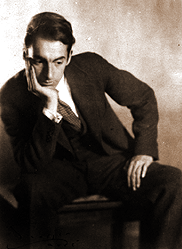
Mi favorito poema de Neruda de nuestro libro está “Me gustas cuando callas porque estás como ausente” porque cuando lo leí en español, creí que era sobre una situación muy común pero él diseca la situación en algo más sencillo. Pensí que cuando dice “Me gustas cuando callas porque estás como ausente” la mujer (quizá una novia) no está hablando a él problamente porque ella está enojado y por un momento es mejor que gritando. Pero al fin, dice que “distante y dolorosa como si hubieras muerto”, entonces la situación hace incómodo y lo ve la silencia como está mala; después dice “una palabra entonces, una sonrisa bastan” porque se gustaría que ella hable, casi negociando con ella por solo una palabra y una sonrisa. El último frase “Y estoy alegre, alegre de que no sea cierto” significa que el está alegre que ella no es muerte.
Pero a mí, es interesante que en inglés, lo leyera diferentemente. I read “I like you when you are silent because you are as though absent”, and I saw different images of what Neruda was trying to convey. I saw someone who was sad and wasn’t speaking because they were unable, choked up perhaps. “and you are like the word melancholy” stands out to me more in the English version. Of course, I understand English better than Spanish (though I enjoyed the poem better in Spanish than in English) and I imagine that because of this my interpretation of the Spanish version was probably wrong. My point being though, that translated, the poems meaning changes and certain things that are more significant in Spanish can sound less in English and vise-versa. What threw me off initially was the word “callas” in comparison to “silent”. I read callas to be something a little more malicious, like “I like it when you shut up because it’s like you’re absent” (haha, not quite as poetic as the translation). As you may well see, from that starting point, the poem takes on a whole new meaning.
I would like to know more about how other people interpreted this poem. Please share…
Pero a mí, es interesante que en inglés, lo leyera diferentemente. I read “I like you when you are silent because you are as though absent”, and I saw different images of what Neruda was trying to convey. I saw someone who was sad and wasn’t speaking because they were unable, choked up perhaps. “and you are like the word melancholy” stands out to me more in the English version. Of course, I understand English better than Spanish (though I enjoyed the poem better in Spanish than in English) and I imagine that because of this my interpretation of the Spanish version was probably wrong. My point being though, that translated, the poems meaning changes and certain things that are more significant in Spanish can sound less in English and vise-versa. What threw me off initially was the word “callas” in comparison to “silent”. I read callas to be something a little more malicious, like “I like it when you shut up because it’s like you’re absent” (haha, not quite as poetic as the translation). As you may well see, from that starting point, the poem takes on a whole new meaning.
I would like to know more about how other people interpreted this poem. Please share…





